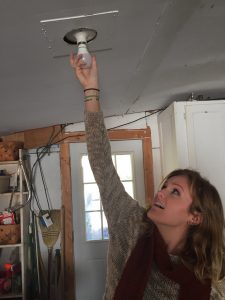Front Porch Blog

Watauga County resident Lydia Head with volunteers Sarah Merlotte and Hannah Emery (not pictured: Taylor Petty) Photo: Katie Kienbaum
To get through the dark evenings since Daylight Saving Time ended on November 6, people are turning on more lights for longer periods of time. Unfortunately, this means that their energy use and electricity bills go up.
Winter heating costs already place a great burden on many Appalachian families, with energy bills sometimes amounting to more than 20% of total family income. High bills are often the result of leaky, inefficient homes, but, making energy efficiency improvements are prohibitively expensive for those struggling the most with their electricity bills.
To make this winter a little easier for folks facing high energy bills, Appalachian Voices devised the Daylight Savings Challenge. We challenged students at Appalachian State University to help us replace as many lights as we could with energy-efficient LED light bulbs by the Daylight Saving time change on November 6.
The new LED bulbs, donated to Appalachian Voices by Hospitality House, use 75% less energy than traditional incandescent light bulbs. Replacing a single, frequently used incandescent bulb with an LED could save up to $15 a year. LEDs also last longer (sometimes up to 25,000 hours or 25 years) and do not contain potentially hazardous material, such as the mercury found in compact fluorescent light bulbs. With lower prices and more bulb and color options than ever before, now is the time to switch to LED lighting.
For the Daylight Savings Challenge, five student volunteers helped us distribute almost 100 energy efficient LED light bulbs to seniors across Watauga County, N.C. By the extended end date of November 15, we replaced nearly all of the light bulbs in six homes at no cost to the residents. To locate participants, we partnered with Watauga County Project on Aging, which provides services to senior citizens, many of whom live on fixed incomes which makes it hard to afford energy efficiency upgrades.
Some seniors also have limited mobility and face difficulties replacing burned out bulbs. Installing the longer-lasting LED light bulbs extends the amount of time before the bulb will have to be replaced again. “I couldn’t even go down [to the basement] to see how many were burned out,” said Lydia Head of Boone, N.C. “We are very thankful.”
All together, the replaced bulbs should save the participants at least $280 (about 3,390 kWh) a year. That translates to about 1.75 tons of coal that won’t get burned and more than four tons of carbon dioxide pollution that won’t contribute to climate change. And since these LED bulbs last approximately five years, the participants will save energy year after year.
It’s not too late to switch! Replace the light bulbs in your home with energy efficient LEDs to save your pocketbook and the planet.
PREVIOUS
NEXT
Related News

Leave a comment
Your email address will not be published. Required fields are marked *


Leave a Comment